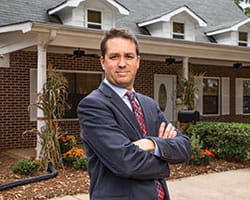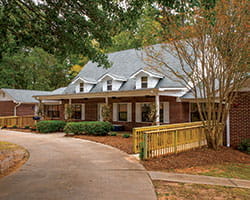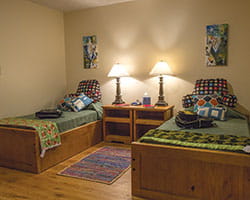
Eleven kids—with seven in diapers—would be tough for anyone. Just ask Dr. John DeGarmo ’12 and his wife, Kelly. They have fostered dozens of children over the past 13 years, and they’ve adopted three of them. But a few years ago, when the DeGarmos had 11 children under their roof, they reached a breaking point.
“We realized we couldn’t keep doing that,” says DeGarmo, a Doctor of Education (EdD) graduate. “But at the same time, we knew we needed to keep helping foster children.”
The solution they came up with was Never Too Late, a group home for foster boys ages 9 to 18, which had an official open house at the end of October in Monticello, Georgia.
“Kelly and I truly believe it’s never too late for a child to find healing and hope,” he says. “Now, we can help make that a reality.”

Among the more than 400,000 foster children in the United States annually, preteen and teenage boys are typically the hardest to place. Compared to 89% of the general foster care population who exited to reunification, adoption, or legal guardianship in 2014, youth older than 12 exiting to permanency was only 63.9%. Believed barriers to that permanency for teen boys include higher rates of risky behavior such as substance use, incarceration, and fathering children, according to Child Welfare Outcomes 2010–2014, prepared by the Children’s Bureau of the U.S. Department of Health and Human Services. These older foster care children usually bounce between homes, develop anxiety and attachment issues, and struggle to assimilate into new families.
As a result, they’re more likely to face dire outcomes: According to the U.S. Department of Education, only 65% of students who are in foster care at age 17 graduate from high school by age 21. Recent studies of foster youth in different states indicate that anywhere from 25% to 46% experience at least one incidence of homelessness after they age out of the system.
DeGarmo drew upon his Walden dissertation, which focused on the needs of foster children in rural areas, to design Never Too Late and create a new path for these children. Sixteen boys live at the home, and their guidance and care are managed by an on-site house family.

The boys go to school; attend music, art, play, and animal therapy sessions with professional counselors; and learn skills that will help them succeed when they age out of the foster care system, such as how to cook meals, clean their living spaces, and apply for driver’s licenses and jobs.
But Never Too Late can only impact so many lives at a time. DeGarmo is now traveling the country, seeking additional funding for the nonprofit and meeting with people interested in bringing the model to their own communities.
In the 5 years since DeGarmo graduated from Walden, he has dedicated his life and career to helping foster children. He knows not all people have the resources to give but stresses that everyone can help a foster child in some way. In addition to Never Too Late, DeGarmo recently launched F10K, a nationwide effort to recruit 10,000 foster families by 2020. Walden alumni can help by signing up or sharing the information with friends and family interested in adopting or fostering children.
“The area of need is right there, in your own state or your own city,” DeGarmo says. “We’re all called to help these children. If not us, then who?”



